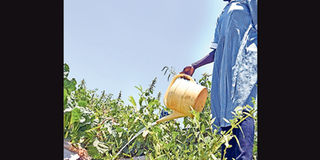Primary school gets farming makeover

A pupil member of the agriculture club at Kalobeyei Settlement Primary School in Turkana West waters crops that they grow in their farm. Lotino Lino, the patron of the agriculture club describes the project as a way of integrating agriculture in learning. PHOTO | EVANS HABIL | NMG
What you need to know:
- Lotino Lino, the patron of the agriculture club carrying out the farming with assistance from Food and Agriculture Organisation (FAO), describes the project as a way of integrating agriculture in learning.
- When they sell the vegetables, half of the proceeds are ploughed back to the farming project while members share the rest of the money to buy their personal effects and support their families.
- One such household is that of Ms Lina Akot, a refugee farmer from South Sudan, who resides at Kakuma Refugee Camp about 20km away.
A section of Kalobeyei Settlement Primary School in Turkana West sub county has acquired a complete makeover.
Vegetables such as sukuma wiki (collard greens), spinach, amaranth and tomatoes grow with vigour on the once dry patch.
And tubers that include sweet potatoes and arrowroots are equally doing well in the arid region. The school is now a lush garden of beauty and hope for not just the pupils, but also the local community.
Lotino Lino, the patron of the agriculture club carrying out the farming with assistance from Food and Agriculture Organisation (FAO), describes the project as a way of integrating agriculture in learning.
“It was hard to imagine that the land could produce any food a year ago. But this project has made farming a lifestyle for us. We now have more than 50 members in the agriculture club doing various farming activities on various,” Lino narrates.
When they sell the vegetables, half of the proceeds are ploughed back to the farming project while members share the rest of the money to buy their personal effects and support their families.
FAO manager Kakuma sub office Francis Ekiru says the organisation carries out the projects through the Junior Farmer Field and Life Skills established in schools as agricultural clubs.
ALTERNATIVE WAYS OF LIVELOHOOD
“We engage the pupils in hands-on learning on agriculture practices by training them and exposing them to various technologies through the school gardens where they grow different types of vegetables. What they learn in school is later replicated at home especially in backyard gardens,” says Ekiru.
The project, Ekiru notes, got off to a robust start, as more locals and refugees continue to adopt crop production one year after the programme started, “enticed by the delightful produce that their children take home”.
One such household is that of Ms Lina Akot, a refugee farmer from South Sudan, who resides at Kakuma Refugee Camp about 20km away.
Akot grows a variety of vegetables on her small plot just outside the camp, from which she is able to make money for use in her household of nine.
“We eat the vegetables and sell the remainder. This way, I am able to buy clothes and shoes for my eight children. I am also able to save some money for emergencies,” she says.
The project does not target members of the refugee community only, and as Ekiru reveals, FAO hopes to rope in members of the Turkana community.
“When there is enough rainfall, the locals grow food crops, but revert to pastoralism when there is a shortage of rainfall. But even pastoralism has become unsustainable with unpredictable rainfall patterns forcing them to look for alternative ways of making livelihoods,” he explains.




